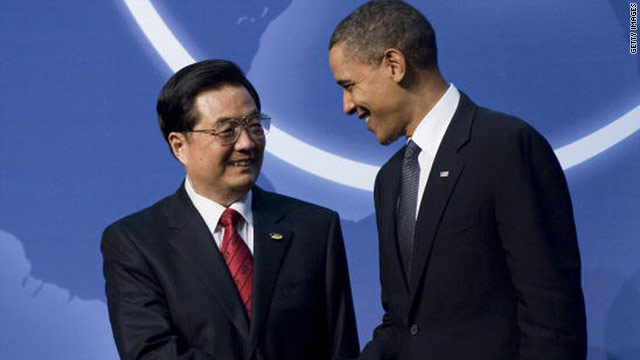Truth Vibrations
New member

-- Chinese President Hu Jintao arrives in Washington on Tuesday, a day before a high-profile meeting with U.S. President Barack Obama to discuss trade, currency and a host of other issues, including North Korea.
Chinese state media has reported that Hu will stress how a constructive, comprehensive partnership between the powers could be mutually beneficial and help ensure stability in Asia and worldwide despite differences between Beijing and Washington.
In addition to Obama, Hu is also scheduled to meet with top legislators and business executives. After Washington, Hu will make a stop in Chicago.
Wednesday's meeting between the leaders of the world's two largest economies has put the spotlight on criticism that the government-controlled People's Bank of China artificially undervalues the yuan, bringing down the cost of Chinese exports, which would give it an advantage in the international market.
Last week, Treasury Secretary Timothy Geithner said China must do more to address its undervalued currency and dependence on exports, adding that such a move is in Beijing's best interest because it will control inflation.
Senate Democrats this week renewed their push to crack down on countries that manipulate their currencies, with China clearly in their crosshairs.
A bill introduced Monday by Sen. Charles Schumer and two other Democrats would impose penalties, including possible tariffs, on nations that manipulate their currencies.
The Senators told reporters in a conference call that China's currency and trade polices undercut U.S. manufacturers and are costing American jobs.
"China's currency is like a boot on the throat of America's economic recovery," Schumer said.
But Hu dismissed the argument that price stability is a reason for yuan appreciation, telling the Washington Post and the Wall Street Journal that Chinese inflation is "moderate and controllable."
In an apparent attempt to smooth relations ahead of this week's meeting with Obama, the Bank of China last week began providing the yuan directly to U.S. traders for the first time.
The Chinese president has complaints of his own, particularly with Federal Reserve policy aimed at stimulating the economy. The policies particularly affect China, given that it holds billions of dollars in government debt.
Fed policy makes U.S. bonds a less attractive investment for the Chinese.
Hu is expected to lay out his vision for U.S.-Chinese relations during his three days in Washington, China's Xinhua news agency reported over the weekend.
Zhang Yesui, China's ambassador to the United States, hyped the visit as vital to relations between the Communist state and a democratic power, according to a Xinhua report published Saturday.
He said that it was important to continue bilateral ties and address issues through dialogue, while adding that disagreements were inevitable given political, cultural and economic differences. Ultimately, Zhang said, the nations can and should create a "win-win situation" through positive diplomacy.
This hopeful rhetoric, though, comes as officials in Washington have recently suggested that Beijing has been slow to act in some respects, and generally should consider altering its approach to reflect its increasing influence.
In a speech at the State Department Friday, U.S. Secretary of State Hillary Clinton said that China must assume the responsibility of being a world power, rather than basing policies on its own self-interest.
Clinton acknowledged that relations between Beijing and Washington were at a "critical juncture," noting persisting tensions on economic and security issues and accusing China of discriminatory practices that put American firms at a disadvantage.
Still, insisting that the United States doesn't view China as a threat, she said, "our economies are intertwined and so are our futures."
"A thriving America is good for China, and a thriving China is good for America," said the top U.S. diplomat.
One hot-button issue that Beijing addressed on Sunday was the Korean peninsula, days after Clinton urged China to use its "unique ties" with North Korea to tamp down tensions there.
Urging an early resumption of long-stalled six-party talks committed to reining in North Korea's nuclear program, Assistant Foreign Minister Hu Zhengyue told Xinhua that "the peninsula's denuclearization and the normalization of relations" was in all parties' interest.
"China will continue to work with all the parties concerned and the international community to ensure peace, stability and prosperity," he said.
